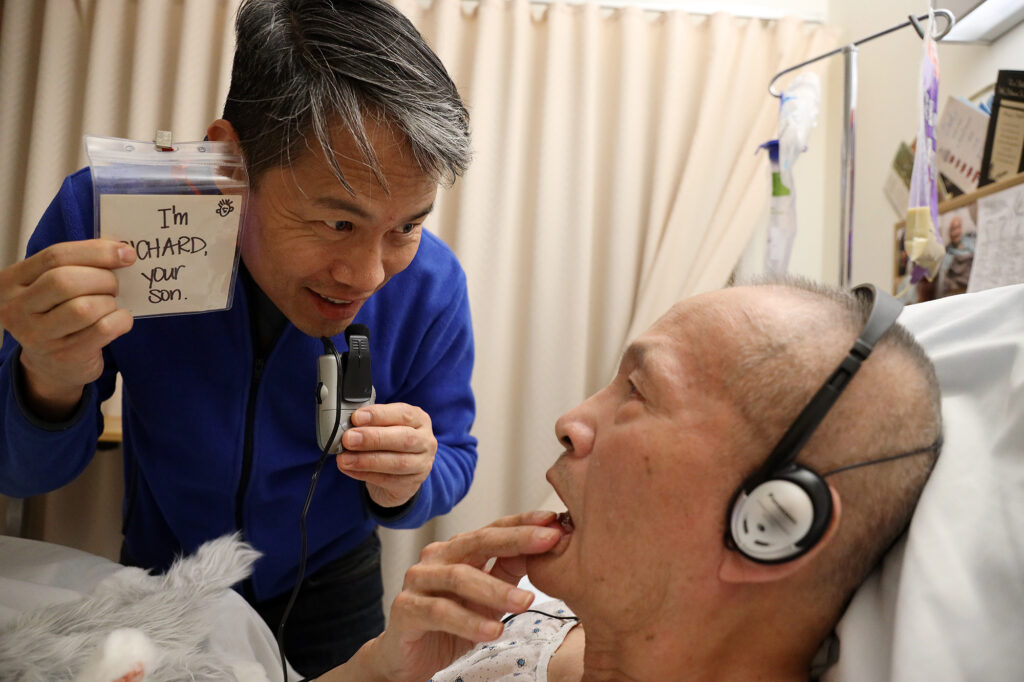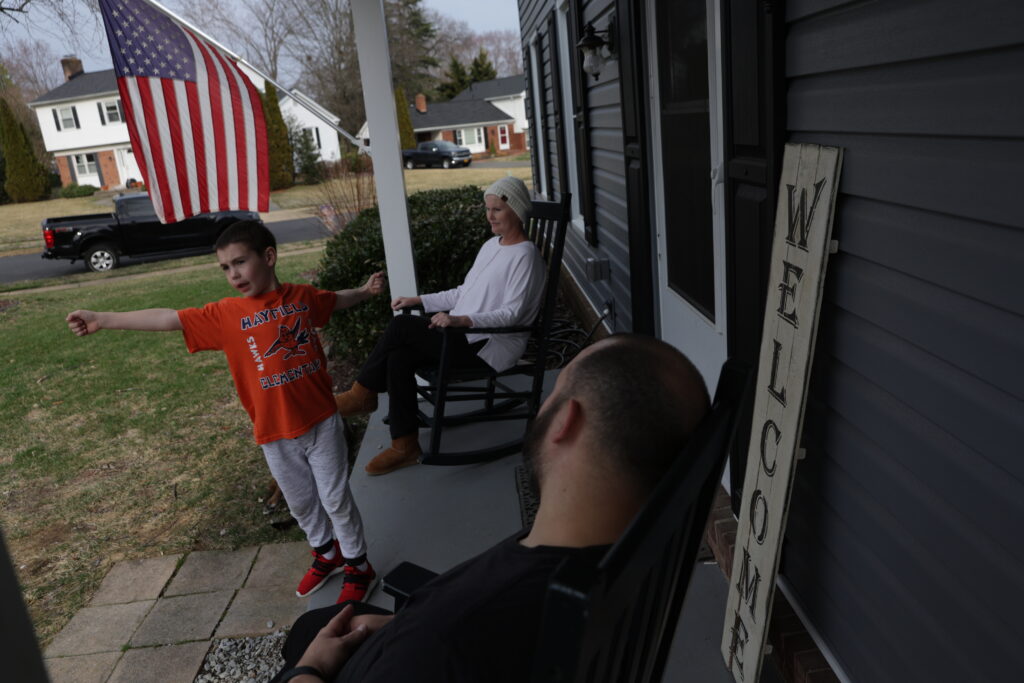May 15, 2023
by Carla Hay

Directed by Richard Lui
Culture Representation: Taking place in California, Virginia, Alaska, and New York City, the documentary film “Unconditional” features a predominantly white group of people (with some Asians) discussing lives of people who need caregivers.
Culture Clash: Disabled people and their caregivers experience a high amount of stress that might not always be adequately treated, and family members might not always agree on how to deal with the end of the disabled person’s medical issues.
Culture Audience: “Unconditional” will appeal primarily to people who are interested in very personal and memorable stories about families who are involved with caregiving for loved ones with medical issues.

“Unconditional” is an informative and deeply moving documentary about people with serious medical issues and their family caregivers. The movie is made all the more personal because “Unconditional” director Richard Lui shares his own intimate story as a caregiver. Lui is the narrator of this documentary, which does not sugarcoat the despair, stress and frustrations that can happen when loved ones have to take on the responsibility of caregiving. However, “Unconditional” (which was filmed over seven years, including the beginning of the COVID-19 pandemic) is ultimately a positive showcase for family love and loyalty under very difficult circumstances.
“Unconditional” focuses on the stories of three families, who each have a loved one with a life-threatening disease or medical condition:
The Lui Family: “Unconditional” director Richard Lui, who is a New York City-based anchor for MSNBC and NBC News, is shown helping take care of his father Stephen Lui, an Alzheimer’s disease patient. After his father (a retired social worker) was diagnosed with Alzheimer’s disease (which destroys people’s memories and muscle functions), Richard requested a switch to a part-time work schedule on weekends, so that he could be in his parents’ hometown of San Francisco during the week to help take care of his father, who was in his 80s at the time this documentary was filmed.
Stephen’s longtime wife Rose Lui (a retired schoolteacher) had been his primary caretaker at home, until Stephen’s medical issues required him to be moved to a nursing care facility. Richard’s two siblings Rob Lui and Kristen Lui (who are both in the documentary) also help take care of their father Stephen, who eventually lost his ability to speak. It’s mentioned in the documentary that the Lui family had to make a difficult decision on what to do when Stephen forgot to know how to swallow. After much debate, the family decided to have a risky but effective way of getting Stephen fed: having a stomach tube inserted inside him.
The Bushatz Family: Luke Bushatz is a military veteran who is living with numerous medical issues, including post-traumatic stress disorder (PTSD), cardiac disease, a brain injury, substance addiction. He received his brain injury in 2009, when an improvised explosive device (IED) bomb went off and trapped him in a vehicle.
Luke, his journalist wife Amy Bushatz, and their two underage sons David Bushatz and Huck Bushatz live in Palmer, Alaska. Amy says that the family moved there to “get a fresh start. Luke finds it healing to go hiking in the mountains. However, he lives with the negative effects of his medical issues every day, including forgetfulness, having a bad temper, insomnia, and paranoia about being ambushed by bombs or other weapons.
Amy’s journalist specialty is giving coverage of caregivers and military families. She doesn’t mince words when she says that she’s not a saintly caregiver, which is the image that many caregivers (especially women) are expected to have. Amy admits that when Luke does something that annoys her, she will get angry and impatient with him. She says that she’s been coping with the stress by seeing a therapist. Luke and Amy both mention that their marriage nearly reached a breaking point between 2012 and 2015, because of Luke’s substance abuse problems and suicidal thoughts, which he was able to overcome with therapy.
David, the older and more sensitive of the two brothers, seems to have a better understanding of how the serious issues that his father Luke has. In the documentary, David talks about trying to be as quiet and invisible as possible because he gets afraid when his father is in a bad mood. Luke admits that he has “blackout” temper tantrums. Younger brother Huck, who has a much rosier view of his father, mainly talks about Luke being a war hero. Huck seems to be have a much stronger emotional bond to Luke than David has, while David seems to be closer than Huck to their mother Amy.
The Thomas Family: Before she was diagnosed with cancer, Kate Hendricks Thomas was a board member of the Service Women’s Action Network, a non-profit group dedicated to help women who are former and current members of the U.S. military. She and her husband Shane Thomas got married in 2014, the same year that their son Matthew Thomas as born. After her diagnosis, the family moved to Alexandria, Virginia, to be closer to Kate’s side of the family, which includes her brother Matthew Hendricks, who is one of her family members interviewed in the documentary.
At the time that she was diagnosed with cancer, Kate was given only six to 10 years to live. Kate (who was in the U.S. Marines) believes she got cancer from toxic smoke and contaminated water that she had to drink while she served in combat in Al-Fallujah, Iraq. She tried to use this theory as a basis for claim for her son Matthew to get military benefits after she dies, but this claim was denied by the military. However, Kate thinks that she is correct because another woman who served alongside her in combat in the same location also has the same type of cancer.
One of the most heartbreaking aspects of the documentary is showing how family members cope with a loved one who is slowly dying and how the loved ones have to prepare for the inevitable death. Kate breaks down and cries when she shares her overwhelming feeling of dread of knowing that she won’t be around to see Matthew grow up to be an adult. Kate’s husband Shane also gets teary-eyed and choked up when he says in a separate interview: “I’m not ready to be a single parent.” And although Kate says she tries to be as positive and upbeat with Matthew as possible, there are moments when Matthew looks very sad because he knows his mother will die from cancer.
And although all of these middle-class families have the privilege of medical insurance and health care for their loved ones, it’s still a heavy financial burden for the family caregivers to provide what insurance does not cover. Rose Lui nearly drained her savings to pay for the nursing care facility where her husband Stephen had to be relocated. (It’s mentioned in the documentary that that it cost $10,000 a month to have Stephen at the facility.) The Thomas Family had to cope with a reduced household income after Kate (who had a higher income than Shane) was no longer able to have a job.
Disabled people who need caregivers are suffering, but one of the most important messages of “Unconditional” is that the caregivers shouldn’t neglect taking care of themselves too. Some caregivers, such as Amy, go to therapy. Rose found solace by taking up violin lessons at the age of 79. Richard got help from support groups of other caregivers. He says of coping with caregiving: “It was a lonely road until I found others.”
“Unconditional” has a no-frills approach to its directing and editing. The movie doesn’t need to be technically dazzling or artsy. The family stories in this compelling and meaningful documentary are more than enough to make an impact on viewers.
PBS premiered “Unconditional” on May 1, 2023. The movie was released in select U.S. cinemas (exclusively at AMC Theatres) for a limited engagement from May 3 to May 9, 2023. “Unconditional” will be released on digital and VOD on June 5, 2023.
